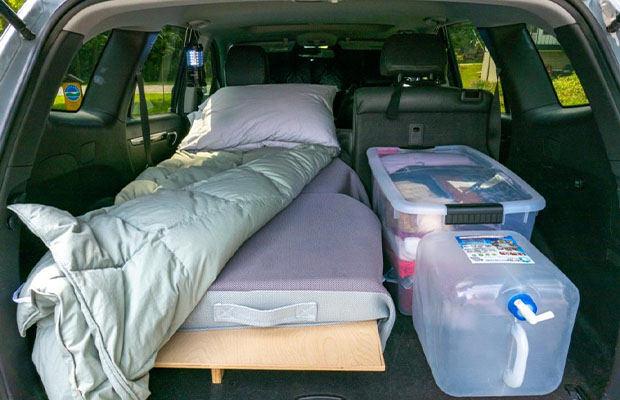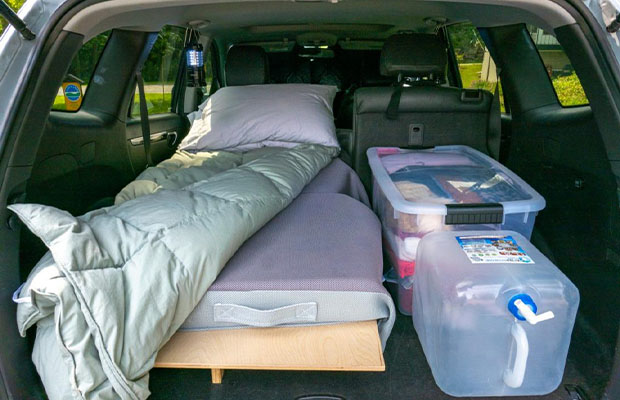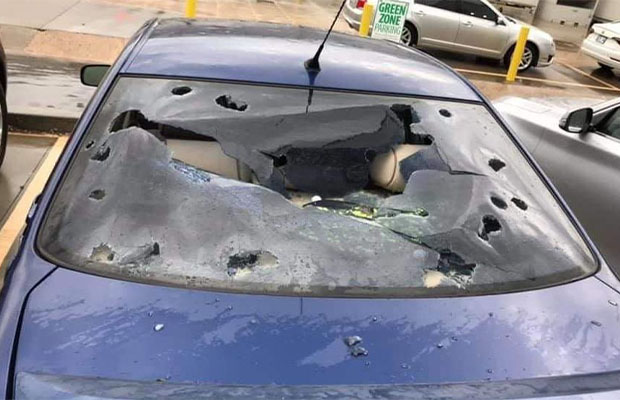To learn how and what to avoid while sleeping in your car, read our guide.
Is it illegal to sleep in your car is a frequently asked question.
Yes, it’s perfectly legal to sleep in your car, as long as you stick to a couple of rules:
- You must be safely parked, and not in violation of any parking restrictions.
- You mustn’t be above the drink-drive limit or under the influence of drugs.
There are a few things you should be aware of before pulling over and sleeping in your car.
Why Is It Illegal to Sleep in Your Car in Some States?
Anywhere in the world, it is against the law to trespass and spends the night on someone else’s property without their consent. It’s also accurate that, due to state-specific drinking and driving laws, it’s illegal to drive while intoxicated and sleep at the wheel. There are restrictions on how long you can park in some public places, such as rest stops. This is done to prevent car camping, turning a rest area into a temporary residence, and for the safety of weary road users in general. Sleeping is not the issue; excessive parking is.
Where Can I Sleep in My Car?
Motorway Service Stations
Never attempt to take a break on a motorway’s hard shoulder. Only in the event of an accident or mechanical failure are they available for use. Instead, pull into the closest rest area or gas station.
Be aware that service stations often limit how long you can stay – typically two to three hours. To avoid oversleeping, it’s a good idea to set an alarm. Some service stations use number plate recognition software to monitor who arrives and departs. One benefit of stopping at a service station for a nap is that you can reward yourself with a strong cup of coffee and an energizing snack before you get back behind the wheel.
Car Parks
As long as overnight parking is permitted, you are permitted to stop in a parking lot to take a nap, but make sure you won’t be charged an outrageous hourly rate for sleeping for an hour and a half. Additionally, keep an eye out for any signs indicating that the parking lot is closed during particular hours; you don’t want to get locked in.
Residential Areas
Parking in residential areas is acceptable and you are allowed to sleep there, but you should be aware that you might draw the ire of nearby residents. Additionally, you should avoid crossing any double yellow lines. Don’t park in any passing areas, and be careful not to block any sidewalks or access to anyone’s driveway.
Public Areas
Many local authorities have restrictions on camping and overnight parking in town centres or at local beauty spots. Watch for warning signs; if you violate them, you risk receiving a fine equivalent to several nights’ lodging. On the whole though, you ought to be alright if there isn’t a sign.
Private Property
Avoid parking up to sleep on private property unless you have permission from the landowner first. Nobody enjoys having the police knock on their window in the morning to accuse them of trespassing.
How to Sleep in Your Car Safely?
It is best to be ready if you are going to be driving a long distance.
Think about putting items in your boot that would make sleeping in a car as comfortable as possible. Along with your emergency kit, bring this.
- Consider packing:
- A pillow
- A sleeping bag and/or blanket
- Energy bars
- Snacks and water
Avoid parking in areas where you feel exposed, drive cautiously, lock your doors, and open the window just a crack to let some fresh air in.
It is best to turn off the heating and air conditioning. Running the engine damages the environment, wastes fuel, and wears out the car prematurely.
Particularly in enclosed spaces, avoid leaving your engine running because there is a slight chance that you could inhale toxic fumes.
Especially if you’re feeling fatigued, it’s a good idea to stop for breaks on long trips. Just make sure to do it legally, safely, and maybe even enjoy the novelty of it.

Can You Sleep in My Motorhome?
If you’re careful where you park your RV, sleeping inside is acceptable. Similarly, if you’re on a tight budget and don’t want to spend money on a hotel, there’s nothing to stop you from sleeping in your car.
In general, you won’t have any issues if you behave politely, discreetly, and don’t display any overt no camping or no overnight stay signs. You should be fine if you arrive late, depart early, and don’t leave any trash behind.
Ask the landowner politely and politely for permission if you want to park on private property. Don’t take it personally if they say no; they have the right to do so.
Don’t Sleep in Your Car If You’re Drunk
Whatever you do, don’t sleep in your car if you’re over the legal driving limit for alcohol. It may seem like a good idea to sleep it off in your car if you have one too many on a night out and end up over the limit but if the police find you, they can charge you with being drunk in charge of a motor vehicle in a public place – even if you’re not driving.
If you are found guilty, you risk having 10 points added to your driving record, losing your ability to drive, paying a fine of up to £2,500, and spending up to three months in jail. Even if you’re curled up in the back seat with the keys safely tucked away, you could still be held accountable. Get a ride or a taxi home instead of taking a chance; then, when you are completely sober the following day, return to pick up your car.
Keep in mind that if you exceed the limit while sleeping in your RV, this rule still applies. If you’re parked at a private campsite, it shouldn’t be an issue, but if you want to stay the night in a parking lot at a bar after a wild night out, you could end up paying.
How To Avoid Driving Tired?
The warning signs are accurate: exhaustion can be fatal. Follow these tips to stay safe and aware when driving:
- Get a good night’s sleep before a long drive
- Don’t drive if you feel too tired – it’s better to cancel an appointment than to put yourself and others at risk
- Take breaks – the After two hours of driving, Highway Code advises taking a break for at least 15 minutes.
- If you do feel sleepy when driving, find somewhere safe to stop, take a 15-minute power nap, have a strong cup of coffee and make sure you feel awake before you head off again.
- Avoid driving immediately after a big meal – the processes involved in digesting your food can make you sleepy.
- Be mindful of any medication that can cause drowsiness – check the side effects on the label and monitor how your body reacts to it before you drive.
Read More: How To Clean Cloth Car Seats?





